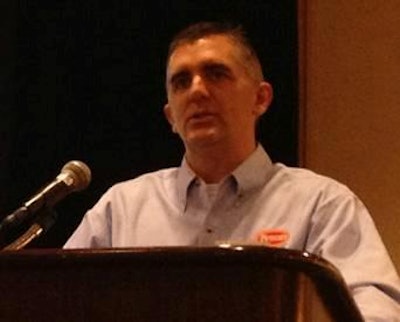
"Greenhouse gas reporting is one of the most difficult areas to get your hands around, because you do not know what you are trying to accomplish. Generally, when you go into a regulation, you are protecting something or there is a standard you are meeting. When we are talking about greenhouse gas reporting, for the most part, it is an information gathering process," commented Steve Patrick, Senior Director of Environmental and Health and Safety Services for Tyson Foods, at the 2013 Environmental Management Seminar in New Orleans, La. The annual conference is sponsored by United States Poultry and Egg Association.
In his presentation, "NESHAP Summary and Greenhouse Gas Compliance," Patrick provided an update on the compliance dates and requirements for new regulations that pertain to internal combustion engines used to generate energy in emergency situations and to shave peak energy demand. He further addressed the compliance dates and requirements for prepared feeds manufacturing and facilities that add manganese compounds to their product. He also reviewed the energy assessment requirements for area source boiler maximum achievable control technology. Patrick concluded his presentation by describing recent updates related to the final mandatory greenhouse gas reporting rule and emissions.
James Taylor, Assistant Vice President of Technical Services for Continental Grain Company, discussed "Risk Management Program Compliance." Taylor remarked that risk management programs are interlinked with process safety management, and that process safety management implementation and execution is critical. Taylor stressed the need of actually understanding the programs versus simply knowing about them. He also emphasized the importance of having upper management involved in these programs, as well as having them actively participate in the company's process safety management system. He ended with, "If management is not on board, your efforts will not be sustainable. Only management can truly make it sustainable."
Another session featured a presentation by Wade Tanner, Project Manager for Reid Engineering, on "Emerging Technology - Aeration Systems." Tanner discussed improvement opportunities in aeration systems, in addition to reviewing emerging technologies for these systems.
Other topics included a "Regulatory/Legal Update: Washington Review and Legal Cases"; "Strategies to Address New Stormwater Permits";" Pretreatment Alternatives; Composting Essentials"; "Nutrient Standards Development: Florida Overview"; "Environmental Sustainability Initiatives"; "Sanitation Chemicals Toxicity Impact"; "Emerging Technology: Wastewater Nutrient Removal"; and "Clean Water Award Winner's Plant Tours."
U.S. Poultry and Egg Association is an all-feather organization representing the complete spectrum of today's poultry industry, with a focus on progressively serving member companies through research, education, communication, and technical assistance. Founded in 1947, U.S. Poultry and Egg Association is based in Tucker, Ga.















